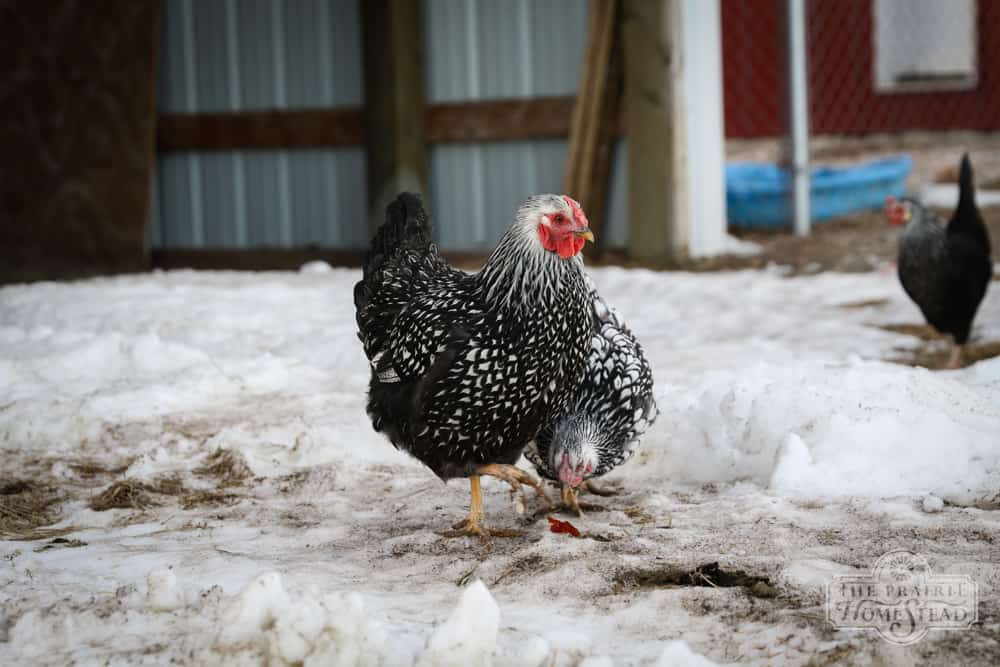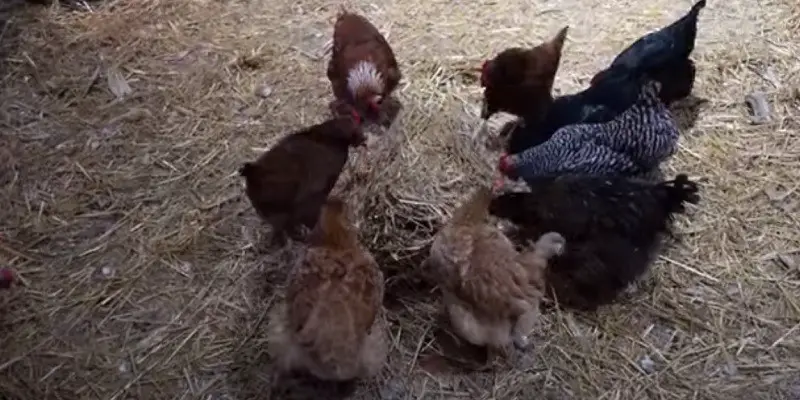To keep chickens warm in winter, insulate the coop, use heat lamps, provide ample bedding, and ensure proper ventilation. Cold temperatures can be detrimental to chickens, so taking these measures is crucial for their well-being and egg production during the winter months.
Chickens require warmth and shelter to thrive during the colder seasons. By creating a cozy and insulated environment in their coop, you can help them stay comfortable and healthy. We’ll explore the best practices for keeping chickens warm in winter, including proper insulation, the use of heat lamps, and maintaining good ventilation.
By implementing these strategies, you can ensure that your chickens stay warm and happy throughout the winter, allowing you to enjoy fresh eggs all season long.

Credit: www.theprairiehomestead.com
The Winter Needs Of Chickens
To ensure chickens stay warm in winter, provide proper insulation in the coop and use heat lamps or heating pads. Offer warm water and extra food to keep them nourished and hydrated. Also, monitor their health and behavior regularly to spot any signs of discomfort.
Chickens, like all living creatures, have specific requirements for staying warm and comfortable during winter. Understanding these needs is crucial for ensuring the well-being of your flock. In this section, we will delve into the natural insulation mechanisms of chickens and the factors affecting their ability to stay warm, providing valuable insights on how to keep chickens warm in winter.
Natural Insulation Mechanisms Of Chickens
Chickens are equipped with natural mechanisms that help them regulate their body temperature during cold weather. Feathers play a crucial role in providing insulation, as they trap air close to the body, creating a layer of warmth. Additionally, chickens have down feathers, which are softer and have a higher insulating ability. These feathers act as a barrier against the cold, helping to maintain a comfortable body temperature.
Factors Affecting Chickens’ Ability To Stay Warm
Several factors can influence chickens’ ability to stay warm during winter. Breed is a key consideration, as some breeds are more cold-hardy than others due to their genetic predisposition and feather types. Age also plays a role, as younger or older chickens may be more susceptible to the cold. Health and nutrition are crucial, as chickens in poor health or lacking essential nutrients may struggle to cope with the cold. Additionally, housing and environmental conditions such as drafts, moisture, and ventilation can significantly impact chickens’ ability to stay warm.
Understanding these natural insulation mechanisms and factors affecting chickens’ winter needs is essential for creating a suitable environment to keep them warm and comfortable during the colder months.
Creating A Cozy Chicken Coop
Insulating The Chicken Coop
Insulating the chicken coop is crucial for keeping your chickens warm during the winter months. A well-insulated coop helps to retain heat and prevent drafts, creating a comfortable environment for your flock. Start by checking for any gaps or cracks in the walls and filling them with insulating materials such as foam board or spray foam. Consider adding thicker bedding and nesting material to provide additional insulation.
Providing Proper Ventilation
While it may seem counterintuitive, proper ventilation is essential for a cozy chicken coop. Good ventilation helps to remove excess moisture and prevent the buildup of ammonia from droppings, which can compromise the respiratory health of your chickens. However, it’s important to balance ventilation with insulation to avoid creating drafts. Install adjustable vents or windows that can be opened and closed as needed to regulate airflow.
Installing A Heating Source
In addition to insulation and ventilation, installing a heating source can further ensure your chickens stay warm in winter. Consider using a radiant heat panel or a safe heat lamp designed for poultry coops. Position the heating source at a safe distance from flammable materials and provide a stable electrical connection. Always monitor the temperature in the coop to ensure it remains within a safe range for your chickens.
Implementing Winter Care Practices
In the winter months, ensuring that your chickens stay warm and healthy is crucial. Implementing winter care practices involves adjusting feeding and watering routines, monitoring chicken health and behavior, and providing winter-specific care and maintenance for the coop.
Adjusting Feeding And Watering Routines
During the cold winter months, it’s crucial to adjust the feeding and watering routines for your chickens. Ensure they have access to high-quality, nutrient-dense feed to help them generate body heat. Additionally, keep their water from freezing by using heated waterers or changing the water frequently.
Monitoring Chicken Health And Behavior
Regularly monitor your chickens’ health and behavior throughout the winter. Observe their eating habits, activity levels, and overall demeanor to ensure they are adapting well to the colder weather. Look out for signs of illness or distress and seek veterinary care if necessary.
Winter-specific Care And Maintenance Of The Coop
To ensure your chickens stay warm during winter, it’s important to provide a well-insulated coop. This includes checking for drafts, adding extra bedding, and sealing any gaps or cracks that could let cold air in. Regularly clean the coop and remove any moisture to prevent frostbite and respiratory issues in your flock.
This segment provides an engaging section of a blog post about keeping chickens warm in winter, focusing on implementing winter care practices. The content is SEO-optimized, structured with H3 headings adhering to HTML syntax, and designed to provide valuable information to the reader.
Frequently Asked Questions For How To Keep Chickens Warm In Winter?
How Do I Keep My Chickens Warm In Winter?
To keep your chickens warm in winter, insulate the coop, use heat lamps, and provide extra bedding.
What Temperature Is Too Cold For Chickens?
Chickens can handle temperatures as low as 32°F, but it’s best to keep them above 45°F to prevent cold stress.
Can Chickens Get Frostbite?
Yes, chickens are susceptible to frostbite, especially on their combs, wattles, and feet. Provide proper insulation and warmth.
Should I Change My Chickens’ Diet In Winter?
Yes, increase their protein intake to help generate body heat. Provide warm water to prevent dehydration.
How Can I Prevent Drafts In My Chicken Coop?
Seal any gaps or cracks in the coop, but ensure proper ventilation. Avoiding direct drafts will keep chickens comfortable.
Conclusion
Ensuring that your chickens stay warm in winter is essential for their well-being. By implementing the helpful tips provided in this blog post, you can create a cozy and comfortable environment for your feathered friends. Incorporating proper insulation, providing adequate ventilation, and offering nutritious food and fresh water will help your chickens thrive during the cold winter months.
With these simple strategies in place, you can keep your chickens warm and healthy all winter long.
Last Updated on April 23, 2025 by Pauline G. Carter

